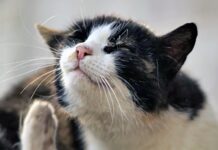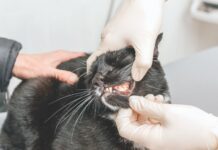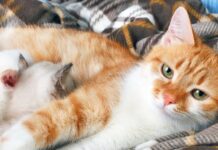Im so upset about my cat, Bruiser. He was a big, fluffy, neutered male, and he died suddenly last week. He was only eight years old, and my veterinarian always told me he was the picture of health. His appetite was good, he hadnt lost any weight, and he was his old perky self the night before, but when I came downstairs in the morning I found him lying dead on the kitchen floor. My veterinarian performed a postmortem examination, and she told me that Bruiser had hypertrophic cardiomyopathy. She said that sudden death is not uncommon in cats with this form of heart disease. Im just devastated. Is there anything I could have done to prevent this?
By nature, we humans tend to blame ourselves when sad things like this happen, but its likely that nothing could have been done to prevent Bruisers passing. Many cats with hypertrophic cardiomyopathy appear perfectly normal in every way, even on physical examination. Perhaps even worse, you might not have been able to prevent Bruisers death even if youd known he had the disease.
Heart muscle sickness
First described in the 1970s, feline hypertrophic cardiomyopathy (HCM) is the most common primary heart disease of cats. (Hypertrophic refers to a specific type of tissue growth, cardio refers to the heart, myo refers to muscle, and pathy refers to disease – so the name literally means enlarged heart muscle sickness.) HCM is an enigmatic disorder that is frustrating to diagnose and treat. Quoting from a recent review article by Catherine Baty, DVM, PhD from the University of Pittsburgh School of Medicine: In the last decade, we have made great progress in our understanding of the disease; yet we now find ourselves armed with reasonable evidence that there is a great deal we still do not know. HCM is no respecter of age: The disease strikes cats both young and old, with males most commonly afflicted. As with the like-named disease in humans, some feline cases have a genetic basis, but most times the cause cant be determined. (HCM is not the same as the now-rare form of feline heart disease, dilated cardiomyopathy, which is caused by diets deficient in the amino acid, taurine.)
Variability is the norm
All cases of HCM have one feature in common: thickening of the muscular walls of one of the four chambers of the heart, the left ventricle. But the disease is extremely variable in every other way. In some cases, the walls of the ventricle are uniformly thickened; in others, only portions are thickened (and the degree of thickening varies, too). In some cases, HCM causes abnormal heart sounds that can be heard through a stethoscope; in others, the heart sounds perfectly fine. In some cases, HCM leads to abnormal – and sometimes rapidly fatal – heart rhythms (the probable cause of Bruisers death); in others, the heart beats normally.
Some cats with HCM appear normal and some are noticeably ill (oftentimes with vague signs of illness, like weight loss and diminished appetite), while others develop overt heart failure quite suddenly. Some cats with HCM may live for many years after diagnosis; others wont make it through the night. Some cats form blood clots in the heart that are expelled into the circulation and cause rear limb paralysis; others dont. Even the response to treatment varies: some cats respond well to treatment while others deteriorate regardless of treatment. Perhaps even worse, its impossible to predict which cats will improve with therapy and which ones wont. We simply dont know until we try.
Whats a cat lover to do?
With all this confusion, whats a reasonable course of action? First, any cat with signs of disease typical of HCM should receive an echocardiogram (an ultrasound image of the heart). Depending on the results, other tests – like X-rays, blood pressure measurements and blood thyroid hormone measurements – will probably be necessary. Treatment depends on the findings, but may include diuretics, beta-blockers, calcium-channel blockers, angiotensin-converting enzyme inhibitors and anticoagulants.
I also believe that healthy cats with abnormal heart sounds that are detectable through a stethoscope (e.g., heart murmurs or types of heart sounds descriptively called gallop rhythms) should get an echocardiogram, too. That said, we dont yet know whether giving medication to healthy cats with early or mild cases of HCM will delay the onset of disease or improve their chances of survival. Veterinary cardiologists opinions vary on this point, but studies are underway that we hope will give us the answers we need.



